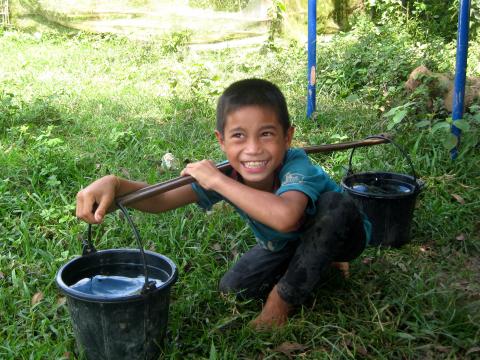Drinking unclean water puts children at risk

Maiphan used to miss school a lot. He was too sick, too often.
The water his family was drinking was unclean.
Every day, they walked nearly two kilometers from their home in Pakkading District to collect the water from a river. The journey was worse in the dry season, when the river dried up and the family had to walk to another river in another village, adding another two kilometers – a total of four kilometers – to get their daily water needs.
What’s more, Maiphan’s family was unaware that drinking unclean water caused illness and water-borne diseases. They drank the water without purifying or boiling it.
As a result, Maiphan was often sick with diarrhea and stomach cramps.
He missed class and his school performance suffered. Even on days when he was feeling good, he was often late because he had to help with the duty of fetching water.
Stories like Maiphan’s are repeated across the globe. The United Nations estimate some 768 million people around the worlddo not have access to clean water.
“Drinking unclean water puts children at risk. As children’s bodies aren’t as strong as adults, drinking unsafe water puts children in danger of deadly bouts of diarrhoea, parasites and other water related diseases,” says Sayasin Khongsavath, World Vision Laos’water and sanitation coordinator.
Recent Lao statistics published in the 2013 Millennium Development Goal Progress Report state that across the country about 70 per cent of people have access to safe drinking water sources. Access to clean water has dramatically increased from 20 years ago when only 28 per cent of the population used improved drinking water sources, the report says.
Still, in many rural areas, particularly those without road access, access to clean water sites is limited. Less than half the population living in these rural areas has access to safe water sources. As such, families walk to the nearest river or stream to collect for their daily household needs. Children and women are often tasked with this, affecting a child’s education and a woman’s income generation activities.
The Lao Millennium Development Goal Progress Report also states that when people do access unclean water, they only treat the water and make it clean to drink about half the time. Often parasites and germs causing diseases are ingested.
To improve the situation, organizations like World Vision partner with the government of Laos in a commitment to help extend access to clean water.
“We know that for every dollar invested in water and sanitation, the savings is three or four dollars later when people do not have to access health centres,”Mr. Khongsavath says.
Working in 24 districts across Laos, World Vision and the government work together to help communities dig boreholes, set up community water taps, build gravity fed water systems for villages, assist in setting up and training village water committees and educate communities of the importance of drinking safe drinking water and adapting hygienic practices.
“When a community has clean water, people are healthier. Children stay in school and are able to focus on their education. Families don’t have to walk long distances to collect water and can use their time to improve their income generation opportunities. It’s a big win when there is safe water brought to a village,” Mr. Khongsavath says.
Maiphan’s village is one of the success stories.
Two years ago, when World Vision started working in Pakkading district, the community’s leaders identified the need for better water. World Vision provided cement, zinc, ropes, poles and hammers for the construction of a well.
The government’s health officers trained the villagers how to build the well. Soon, the community got to work, they set up a water management committee, dug the well and brought fresh water to their own village.
World Vision staff also conducted health awareness training to children, families and teachers to help people better understand the importance of drinking clean water and boiling unclean water to purify it.
For Maiphan, having a water source five-minutes away from his home has made a huge different. Maiphan’s health has improved, along with the health of the rest of his family. He no longer misses school because he is too sick.